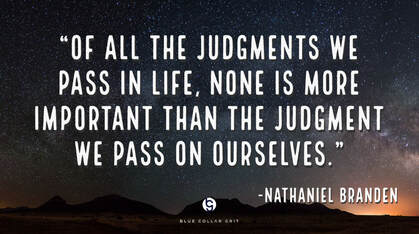Confidence v ArroganceWatching the NBA Playoffs I’m reminded of the arrogance surrounding many elite, highly compensated athletes. It’s something that has infected all levels of youth sports at this point. The prevalence of it makes me curious about its origin. Where does this arrogance begin?
Naturally, we tend to quickly point to the God-given attributes of the talented and gifted. Afterall, many were blessed with something the rest of us weren’t. To no fault, or credit of their own, some people were born with the genetic makeup to be seven feet tall or with the inherent athleticism to be able to jump really high or run really fast. A sense of arrogance for those gifts seems natural. Of course, we all have heard, or seen, plenty of examples of people that have overcome seemingly insurmountable odds in reaching their success. So, though nature may be a part of it, it’s clearly not all of it. I mean, not only talented and gifted people are arrogant - and not all talented and gifted people are arrogant. It seems the nurture aspect must be at play as well. How we are raised by our parents, who we grow up admiring, what we see as cool or desirable all have significant impacts on our mindset. Afterall, isn’t that what arrogance, or confidence, indicates? A clear view of our mindset. Why Should We Care? Confidence is the feeling or belief that you can rely on something or someone, like yourself. Arrogance is the exaggeration of your own worth or importance. Though they are connected, they are far from the same things. The most telling difference isn’t found in their accolades, body language, or choice of words. It’s tied directly to their prioritization of the process or the outcome. Arrogance has a very intimate relationship with the outcome. Those living with arrogance are quick to highlight their accomplishments and hide their failures. They view the outcome as their measuring stick. It provides the sole barometer for success in their lives. And, it works for a lot of people as far as achievement is concerned. However, proceed with caution because when the accomplishments begin to fade, it’s not the arrogance that is lost. It’s the person’s self-worth. Confidence is married to the process rather than the outcome. Those living with confidence aren’t as sure of the outcome as they are that they will be fine regardless of the outcome. The result simply provides feedback for future processes. Processes that will be better than the ones before. It’s this continuous personal renewal that breathes life into the confident person. With each reverberation, their confidence grows, reassuring themselves that they are, indeed, ok and continuing to grow. Our relationship with the process and the outcome defines so much of how we see the world. REAL TALK - Action Steps So, what do we need to do in order to trust the process? To stay focused on it instead of the outcome? Good questions. Here are a few ideas.
Confident people know their process is the reason for their success, regardless of the outcome. Arrogant people think their accomplishments and achievements validate their success, regardless of the process. One is a firm foundation for our self-worth, the other is not. Trust the process. Surrender the outcome. For more information on building excellence in your teams, visit us at www.bluecollargrit.com. We would love to know how we could help!
1 Comment
What We FearI started writing a book for myself.
Initially the daily writing process was a way to bring clarity to my thoughts. Afterall, if you can’t write it down, do you really understand it? During the Covid shutdown, I would get up daily and write for four to five hours each morning. It doesn’t take long for that amount of time writing to accumulate into pages and pages of thoughts and ideas. Though I had spent most of my time writing privately, I eventually shared what I had been doing with a few family members and close friends. One of those friends, Ryan Hawk, asked me if I was going to publish it. At that point, I had not even considered that thought. As I began thinking about the idea of publishing a book, I immediately felt the effects of imposter syndrome. I mean, who am I to write a book? Who would want to hear what a teacher and coach had to say? What makes me think I have anything worth sharing when there are thousands of teachers and coaches out there far better than me at what we do? The feeling of inadequacy was significant. Then I dug into those feelings and at the root of them it wasn’t inadequacy or inferiority. It was insecurity. I was simply afraid of what other people would say about my writings. Ironically, detaching from the approval of others was a central theme in my story and writings. Yet, here it was again, holding me back. Why Should We Care? The National Institute of Mental Health reports public speaking as the fourth most common phobia among people, falling behind only death, spiders, and heights. It would seem the first three all direct us back to the potential for number one, death. Number four, public speaking - which we’ll lump in with publishing your own words, however is quite different. There is nothing about public speaking that would indicate it’s life threatening. It’s a lot of things, but potentially deadly isn’t one of them. Challenging? Yes. Uncomfortable? Likely. Imminent danger? Not so much. So, what is it? What about speaking in public or publishing your words causes over 40% of people to be afraid? While we might think the answer lies in a lack of skill, the answer is much more basic than that. We’re afraid of what others will think about us. Silly, I know, but it’s undoubtedly true. REAL TALK - Action Steps So, by my calculations, that puts fear of death at number one - throwing spiders and heights into that category - and fear of what others think of us as number two. The difference in those two things is pretty drastic. Here are a few thoughts on maintaining some perspective on number two.
So, here's the meat of the advice: if it comes from your people, listen and consider it; if it comes from your critics ignore it. By the way, the stories and critiques you have running through your head are always from your critics perspective. Will you miss some feedback that could potentially help you by ignoring your critics? Sure. But, if you're in tune with your foxhole and those in the arena with you, they'll provide the same - if not better - advice free from the judgment the critics love to dole out. For more information on building excellence in your teams, visit us at www.bluecollargrit.com. We would love to know how we could help! The Power of Your CircleHave you ever noticed that trouble travels in groups?
I spend the first half of my day teaching leadership classes. We talk about purpose, core values, living intentionally … inspiring stuff. Things that give you life and make, as Sherri Coale says, “your heart sing”. I spend the second half of my teaching day supervising In-School Suspension. While I spend much of the time building relationships and counseling these students, it is also meant to serve as a punishment - no talking, no phones, no sleeping. As you might guess, the repeat offenders to ISS are considerable. It seems the same students find themselves back in lockdown week after week. One could make a compelling argument for the lack of effectiveness of a punishment that leads to such high rates of repeat offenses, but that’s for another day. The more interesting commonality with our ISS clientele is their connections. They all know each other. Actually, it’s deeper than that. They all run in the same or similar circles, and all of the circles have been in ISS over the course of the school year. That’s not a coincidence. Look around. You are who you surround yourself with. Why Should We Care? The good news is, the opposite is also true. I spent a few days last week at the Learning Leader Summit in Columbus, led by Ryan Hawk. The organization of the event was great. Each speaker was knowledgeable, passionate, and inspiring as they shared just a sliver of their expertise and excellence with the group. Yet, as incredible as all of that was, none of it stood out to me as the most powerful aspect of the event. As I looked around the room, I noticed one thing very clearly - there were no slugs. No one allowing time to just pass by. No one answering emails or scrolling on their phones while the speaker was presenting. All the people were present, engaged, and intentional. I certainly try to live this way all the time but, in this environment, I could feel myself being lifted higher. My standards were raised not by anything that was said or written down, but simply by the presence of the people in the room. I could feel the peer pressure. Of course, we all know the importance of the people that we surround ourselves with. We've heard adults echoing the warning since entering middle school. Yet, we still dismiss the true impact of the company we keep. Events like this remind me of just how important it is to stay connected to those also pursuing excellence. And, there’s not that many of them. REAL TALK - Action Steps As we get older, if we aren’t careful, our circle will be chosen for us. Family, co-workers, parents of our children’s friends are all examples of circles we could be thrust into. Nothing is wrong with any of them. I’m sure there are aspects of all that can provide happiness and fulfillment in our lives. In order to grow in our pursuit of excellence, however, our circle can’t be left to the luck of the draw. We will need to select, grow, and intentionally engage with those we want in our excellence circle. Here are a few things to consider in this process.
Chance is a terrible story teller. We all need to consider the time we are spending around those that lift us up by simply being around them. It doesn’t need to be all the time, but it likely needs to be more of the time. For more information on building excellence in your teams, visit us at www.bluecollargrit.com. We would love to know how we could help! Prove ItA lot of people nowadays have never heard of the basketball game HORSE or PIG, which is sad. It’s a driveway classic that gives the old, slower, less athletic hoopers among us a chance to taste victory every once in a while.
In HORSE, one player shoots a shot. If he makes it, then the next person has to make it or they get an H, or the next letter in the word HORSE. Players are eliminated from the game when they get an E. However, depending on who you are playing with, you may be required to “prove it” even after the other player misses the final shot. To “prove it” you simply have to make the same shot again. By proving it, you remove all doubt. Why Should We Care? Too often we live a life of existence, applying little thought to our lives and why we even do the things we do. We don’t know why we work, why we go to school, why we talk to our friends or kids the way we do … And, when asked, we simply default to the canned response, “I don’t know, that’s just what I do.” Pretty sad approach if you think about it, isn’t it? To just exist? To combat the societal pull for just fitting in, we can consider a simple question that will push you to consider the potential of your life beyond existing. What is your proof of life? The things that “prove it” for you, that remove all doubt, are your proofs of life. Do more of them. Most people will immediately take this to weekend plans, vacations, and nights out with friends. And, they certainly may be proof of life for you. However, to fully understand what it is that thrusts us beyond an existent life we need to dig a layer deeper and consider what it is about those weekend plans, vacations, and nights out that prove we are alive. Is it the social interaction with others? Is it the sharing of time with loved ones? Is it the experience of something new that you’ve never seen? Once we know the reason, we can be intentional about including that behavior and purpose in more of our activities. It’s intentionality to what’s important to us that proves it. REAL TALK - Action Steps Understanding your proof of life requires awareness, which is probably why so many people remain existent. Here are a few things to consider in hopes of gaining the awareness necessary to live fully.
If nothing else comes from this, I hope you will at least ask yourself if you are existing or living. And, if you say your living, have the courage to ask yourself to prove it. For more information on building excellence in your teams, visit us at www.bluecollargrit.com. We would love to know how we could help! |
About bcI'm a teacher, coach, and parent seeking excellence while defining success on my own terms. Archives
July 2024
Categories |





 RSS Feed
RSS Feed